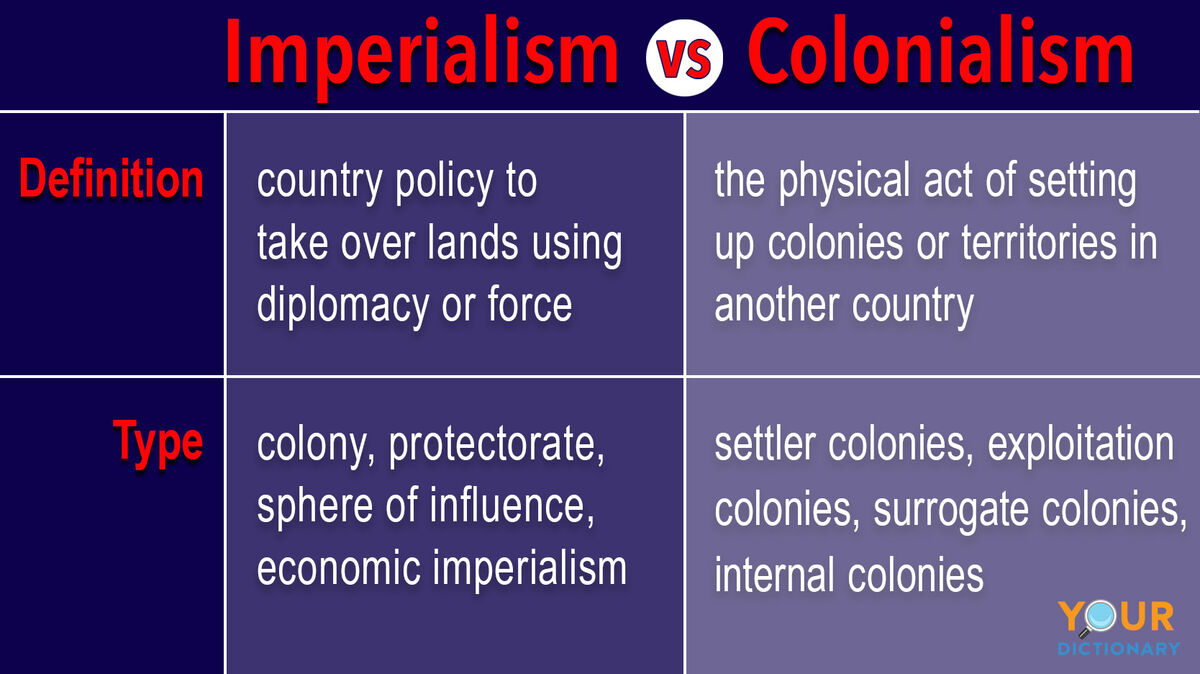Colonization is the process by which a foreign power establishes settlements in a distant territory. Imperialism refers to a broader system of domination and influence.
Colonization and imperialism are related concepts that refer to the expansion of one nation's influence and control over other regions or territories, but have fundamental differences.

What is colonization?
Colonization is a term used to describe expansion of foreign powers to distant lands across the globe.
Example sentence
- Colonization primarily involves the establishment of settlements or colonies by a foreign power in a distant region.
- Economic exploitation is a common motive behind colonization, as colonizers seek to extract resources, such as minerals, agricultural products, or labor, from the colony.
- The process of colonization may involve cultural assimilation, as the colonizing power often imposes its language, religion, and customs on the indigenous population.
- Colonization often leads to the displacement and marginalization of indigenous peoples.
- The colonization of distant lands by European powers in the 15th and 16th centuries had far-reaching effects on the cultures and economies of both the colonized and colonizing regions.
What is imperialism?
Imperialism, a term often associated with the expansionist ambitions of powerful nations, played a pivotal role in shaping the course of history during the late 19th and early 20th centuries. European powers, in particular, were engaged in a relentless pursuit of territorial dominance, economic advantage, and political influence.
Example sentences
- Imperialism, the policy of extending a nation's influence through territorial acquisition or economic control, was a prominent feature of 19th and early 20th-century European politics.
- The scramble for Africa during the late 19th century is a prime example of European imperialism, as various European powers vied for control over African territories.
- Imperialism often resulted in the exploitation of indigenous populations and the extraction of valuable resources from colonized regions.
- Some historians argue that imperialism played a significant role in shaping the geopolitical landscape of the modern world.
- The decline of imperialism in the mid-20th century led to the decolonization of many nations and the emergence of new independent states.
Common phrases/idioms
While there aren't many common idioms or phrases specifically involving these terms, there are idiomatic expressions and phrases that relate to the broader themes and consequences of colonialism and imperialism. Here are some examples:
- Carve up (or carve out) an empire: This phrase doesn't use the words "colonialism" or "imperialism" directly but describes the process of one country establishing control over other regions and expanding its territorial holdings, which is a characteristic of both colonialism and imperialism.
- Colonial mentality: This phrase refers to an attitude or mindset that values or imitates the customs, culture, and ideas of the colonial power, often at the expense of one's own cultural identity. It highlights the impact of colonialism on the psyche of colonized people.
- Imperial overstretch: While not an idiom, this term is used to describe a situation in which an empire becomes too extended and overcommitted, leading to difficulties in maintaining control over its vast territories. It's a common consequence of imperialism.
- The sun never sets on the British Empire: This historical phrase refers to the vastness of the British Empire at its height, with territories around the world, such that there was always daylight in some part of the empire. While it doesn't directly mention colonialism or imperialism, it's associated with the British imperial legacy.
- Legacy of colonialism/imperialism: This phrase is often used to discuss the lasting effects, both positive and negative, that colonialism and imperialism have had on the countries and regions that were colonized or dominated.
- Colonize the mind: This expression is used to describe the process of imposing the values, beliefs, and perspectives of the colonizer on the colonized population. It emphasizes the psychological impact of colonialism.
- Imperialistic ambitions: This phrase refers to a country's desire to expand its influence and control over other nations, often through military or economic means.
In summary, "colonization" involves the physical establishment of colonies in foreign lands, while "imperialism" encompasses a broader range of strategies used by powerful nations to exert control or influence over weaker regions. Both colonization and imperialism have been significant features of global history, often resulting in complex and far-reaching consequences.
Discover more about the AI English proofreader, Engram!

Reference














